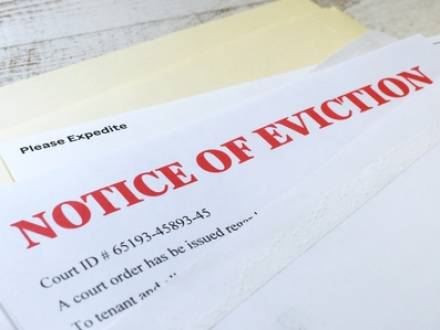Recent Blog Posts
What Happens if I Die Without a Will?
 Making an estate plan can be uncomfortable. Deciding who should inherit your money and property when you are gone forces you to consider the fact that you will not be here forever. Other people avoid making an estate plan because they do not think it is worth it with a small estate, because they expect their closest loved ones to inherit automatically, or because they simply never get around to it.
Making an estate plan can be uncomfortable. Deciding who should inherit your money and property when you are gone forces you to consider the fact that you will not be here forever. Other people avoid making an estate plan because they do not think it is worth it with a small estate, because they expect their closest loved ones to inherit automatically, or because they simply never get around to it.
Unfortunately, not making an estate plan can make administering your estate very complicated for your closest family members. Passing away without an estate plan is called dying intestate. The laws of intestacy decide which of your relatives will inherit what share of your estate. These may or may not be the people you would want to inherit from you. An experienced San Antonio, TX estate planning lawyer can help you create the documents you need to take control of your estate and make the administration process easy for your loved ones.
Estate Planning to Protect Your Disabled Child
 When you learn that your child has severe lifelong disabilities, it is normal to worry about how his needs will be met should you predecease him. Fortunately, there is a lot you can do through estate planning to protect your child with disabilities throughout his entire life. Most people with significant disabilities will qualify for government benefits like Social Security and Medicaid. However, these programs are only designed to meet a disabled adult’s most basic needs, like food, shelter, and medicine. Most parents want much more than this for their children. However, a disabled adult who inherits money directly could lose his benefits, hurting him in the long run. An experienced San Antonio, TX estate planning attorney can help you set aside an inheritance for your child with disabilities without compromising the benefits he will rely on throughout his adult life.
When you learn that your child has severe lifelong disabilities, it is normal to worry about how his needs will be met should you predecease him. Fortunately, there is a lot you can do through estate planning to protect your child with disabilities throughout his entire life. Most people with significant disabilities will qualify for government benefits like Social Security and Medicaid. However, these programs are only designed to meet a disabled adult’s most basic needs, like food, shelter, and medicine. Most parents want much more than this for their children. However, a disabled adult who inherits money directly could lose his benefits, hurting him in the long run. An experienced San Antonio, TX estate planning attorney can help you set aside an inheritance for your child with disabilities without compromising the benefits he will rely on throughout his adult life.
3 Important Issues to Address in a Commercial Lease
 Commercial leases and residential leases are wildly different types of documents. Residential landlords know how all of their tenants will be using the property. The terms of residential leases are so similar across most rental housing that many rules, such as not making noise that will disturb the neighbors’ peace almost go unspoken. Commercial leases must be drafted specifically for the type of property involved, what kind of business activity it is suited to, the landlord’s preferences, and the tenant’s specific plans for the property. A lease for an antique shop opening on the ground floor of a mostly residential building would have to be quite different from a lease for a bar in the nightlife district. An experienced San Antonio, TX commercial leasing attorney can help make sure the right terms are included in your commercial leases. Legal disputes with commercial renters can quickly arise if the terms of a lease are unclear or silent on the wrong issue.
Commercial leases and residential leases are wildly different types of documents. Residential landlords know how all of their tenants will be using the property. The terms of residential leases are so similar across most rental housing that many rules, such as not making noise that will disturb the neighbors’ peace almost go unspoken. Commercial leases must be drafted specifically for the type of property involved, what kind of business activity it is suited to, the landlord’s preferences, and the tenant’s specific plans for the property. A lease for an antique shop opening on the ground floor of a mostly residential building would have to be quite different from a lease for a bar in the nightlife district. An experienced San Antonio, TX commercial leasing attorney can help make sure the right terms are included in your commercial leases. Legal disputes with commercial renters can quickly arise if the terms of a lease are unclear or silent on the wrong issue.
Signs of a Fraudulent Will
 If your intuition is telling you that something is wrong with your loved one’s will, it would be wise to investigate further. The signs of fraud in a will can be subtle, or they may be glaring. If you knew your loved one well and are shocked by the contents of her will, surprised that she had one at all, or find the date of execution questionable because your loved one became incapacitated towards the end of her life, you should speak with a San Antonio, TX probate attorney promptly. Fraud is a fairly common problem in estate planning. Elderly people are often easy for bad actors to take advantage of in this way. People seeking to commit estate fraud may forge a will entirely, write a will, and then instruct an elder to sign it without explaining it or change a person’s will without authorization. It is important to act promptly if you suspect that your loved one’s will is fraudulent. It is best to file a contest within a few weeks of the will being introduced to probate.
If your intuition is telling you that something is wrong with your loved one’s will, it would be wise to investigate further. The signs of fraud in a will can be subtle, or they may be glaring. If you knew your loved one well and are shocked by the contents of her will, surprised that she had one at all, or find the date of execution questionable because your loved one became incapacitated towards the end of her life, you should speak with a San Antonio, TX probate attorney promptly. Fraud is a fairly common problem in estate planning. Elderly people are often easy for bad actors to take advantage of in this way. People seeking to commit estate fraud may forge a will entirely, write a will, and then instruct an elder to sign it without explaining it or change a person’s will without authorization. It is important to act promptly if you suspect that your loved one’s will is fraudulent. It is best to file a contest within a few weeks of the will being introduced to probate.
Five Things You Should Do if You Suspect Your Partner Is Embezzling
 Discovering that your business partner might be embezzling money from your business is a serious and stressful situation. Embezzlement — the theft or misuse of money entrusted to someone — can threaten your company’s financial stability, damage your reputation, and even lead to serious legal issues.
Discovering that your business partner might be embezzling money from your business is a serious and stressful situation. Embezzlement — the theft or misuse of money entrusted to someone — can threaten your company’s financial stability, damage your reputation, and even lead to serious legal issues.
If you suspect your partner is stealing from the business, taking the right steps is crucial to protecting your interests. A Texas business litigation lawyer can help you get through this difficult situation and choose the best course of action.
Do Not Confront Your Partner
It may be tempting to confront your business partner as soon as you suspect he or she is taking money, but acting too quickly could backfire. An accusation without solid proof could lead to legal disputes, retaliation, or even the destruction of evidence. Instead, consult with a business litigation attorney before taking any direct action. A lawyer with experience in handling these kinds of situations can advise you on the best way to proceed while protecting your legal rights and business interests.
How Do Medicaid Asset Protection Trusts Work?
 Most people will need Medicaid or Medicare later in life. Few people are able to maintain private insurance between the time they retire and the time they pass away. Medicaid and Medicare can help people access the care they will need during their old age. Nursing home care can be incredibly expensive - paying out of pocket is not an option for most people. A quality nursing home can cost upwards of $5,000 per month. The problem with using Medicaid is that you can be subject to a Medicaid reimbursement action. A Medicaid reimbursement action can force you to pay Medicaid back using any assets you have. A Medicaid Asset Protection Trust (MAPT) can help protect your assets from Medicaid reimbursement and help you qualify for Medicaid in the first place. An experienced San Antonio, TX trust attorney can help you set up this essential type of trust.
Most people will need Medicaid or Medicare later in life. Few people are able to maintain private insurance between the time they retire and the time they pass away. Medicaid and Medicare can help people access the care they will need during their old age. Nursing home care can be incredibly expensive - paying out of pocket is not an option for most people. A quality nursing home can cost upwards of $5,000 per month. The problem with using Medicaid is that you can be subject to a Medicaid reimbursement action. A Medicaid reimbursement action can force you to pay Medicaid back using any assets you have. A Medicaid Asset Protection Trust (MAPT) can help protect your assets from Medicaid reimbursement and help you qualify for Medicaid in the first place. An experienced San Antonio, TX trust attorney can help you set up this essential type of trust.
When to Evict a Tenant for Nonpayment
 Evictions due to nonpayment of rent have increased over the past five years. During economic downturns, people often struggle to keep up with rent payments even when they are trying to make on-time payments. These situations can be upsetting for landlords as well. Few landlords want to evict a tenant who has a generally good payment history and has always taken care of the property as soon as the tenant falls behind on rent. As a landlord, it may sometimes be worth it for you to give your tenant a chance to catch up. However, there are also times when the best course of action is to proceed with filing an eviction. An experienced Wilson County, TX landlord-tenant law attorney can help you decide what to do when you have a tenant who has stopped paying rent.
Evictions due to nonpayment of rent have increased over the past five years. During economic downturns, people often struggle to keep up with rent payments even when they are trying to make on-time payments. These situations can be upsetting for landlords as well. Few landlords want to evict a tenant who has a generally good payment history and has always taken care of the property as soon as the tenant falls behind on rent. As a landlord, it may sometimes be worth it for you to give your tenant a chance to catch up. However, there are also times when the best course of action is to proceed with filing an eviction. An experienced Wilson County, TX landlord-tenant law attorney can help you decide what to do when you have a tenant who has stopped paying rent.
The Benefits of Giving Tenants a Chance to Pay Past-Due Rent
In some cases, it is better for the landlord to allow a struggling tenant with a good rental history a chance to pay past-due rent and stay in the unit. If the tenant has been with you for several years and has always paid on time, there is a fairly strong chance that the tenant will follow through with paying past-due rent and late fees and go back to making on-time payments in the future. Evicting the tenant and then replacing him will take several months or more, and you may incur costs for advertising or refurbishing the unit. If the tenant does catch up promptly, you will likely save money in the long term.
What Does Undue Influence Mean in a Will Contest?
 One of the most common grounds for contesting a will is claiming that another party - usually a named beneficiary - had an undue influence over the testator as she was creating her will. This claim is often made when one beneficiary spent a lot more time with the testator than the others around the time the testator executed her will. If the party who spent a lot of time around the testator was heavily favored in the will, it might create the appearance of undue influence. However, it is also common for older adults to see some family members more frequently than others, and this fact alone does not show that anyone pressured or convinced the testator to give him more than what she ordinarily would have. If you have concerns about how an undue influence claim might impact a probate case you are involved in, you should speak with an experienced Comal County, TX contested wills attorney.
One of the most common grounds for contesting a will is claiming that another party - usually a named beneficiary - had an undue influence over the testator as she was creating her will. This claim is often made when one beneficiary spent a lot more time with the testator than the others around the time the testator executed her will. If the party who spent a lot of time around the testator was heavily favored in the will, it might create the appearance of undue influence. However, it is also common for older adults to see some family members more frequently than others, and this fact alone does not show that anyone pressured or convinced the testator to give him more than what she ordinarily would have. If you have concerns about how an undue influence claim might impact a probate case you are involved in, you should speak with an experienced Comal County, TX contested wills attorney.
3 Ways to Prevent Will Contests
 If you are taking the time to create a will, you should be able to feel confident that your instructions will be followed. You have likely put a lot of thought into who you would want to take some of your belongings and who you want to leave money to. While will contests are somewhat rare, they do happen. There are steps you, as a testator, can take to reduce the chances that someone will challenge your will in court when you are no longer here to speak on your own behalf. Your intended beneficiaries might be at greater risk of going through a will contest if there is a lot of conflict among your family members if you have left nothing to someone who would naturally inherit from you if you did not have a will, or if you have particularly valuable assets. An experienced Comal County, TX estate planning attorney can help you strategize to prevent will contests before they happen.
If you are taking the time to create a will, you should be able to feel confident that your instructions will be followed. You have likely put a lot of thought into who you would want to take some of your belongings and who you want to leave money to. While will contests are somewhat rare, they do happen. There are steps you, as a testator, can take to reduce the chances that someone will challenge your will in court when you are no longer here to speak on your own behalf. Your intended beneficiaries might be at greater risk of going through a will contest if there is a lot of conflict among your family members if you have left nothing to someone who would naturally inherit from you if you did not have a will, or if you have particularly valuable assets. An experienced Comal County, TX estate planning attorney can help you strategize to prevent will contests before they happen.
Can I Evict a Tenant for Being Messy?
 When you rent out a housing unit to someone else, you should be able to reasonably expect that your tenant will take care of your property while he is living there. Landlords frequently include language in the lease explicitly stating that the tenant has a duty to keep the unit reasonably clean. If you enter for an inspection and find that your tenant is extremely messy, to the point where his unit is something of a health and safety hazard, you may have grounds to start the eviction process. However, a landlord also cannot police a tenant’s housekeeping habits if the tenant is not violating the terms of the lease or creating a hazard for others. If you are considering evicting a tenant for lease violations due to the tenant’s failure to maintain the property, you need an experienced Comal County, TX landlord representation attorney.
When you rent out a housing unit to someone else, you should be able to reasonably expect that your tenant will take care of your property while he is living there. Landlords frequently include language in the lease explicitly stating that the tenant has a duty to keep the unit reasonably clean. If you enter for an inspection and find that your tenant is extremely messy, to the point where his unit is something of a health and safety hazard, you may have grounds to start the eviction process. However, a landlord also cannot police a tenant’s housekeeping habits if the tenant is not violating the terms of the lease or creating a hazard for others. If you are considering evicting a tenant for lease violations due to the tenant’s failure to maintain the property, you need an experienced Comal County, TX landlord representation attorney.

 8531 N. New Braunfels Ave, Suite 100, San Antonio, TX 78217
8531 N. New Braunfels Ave, Suite 100, San Antonio, TX 78217 210-535-0870
210-535-0870




